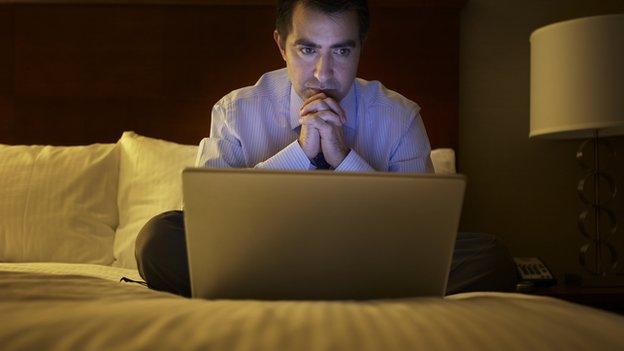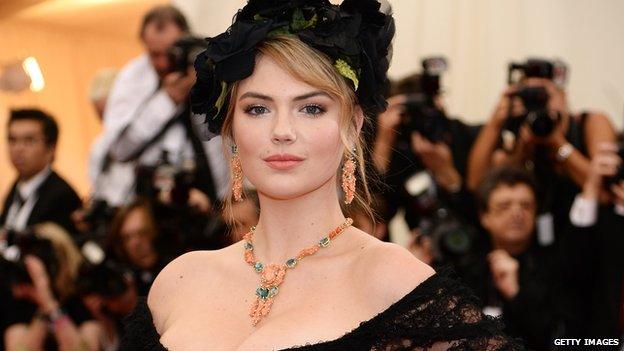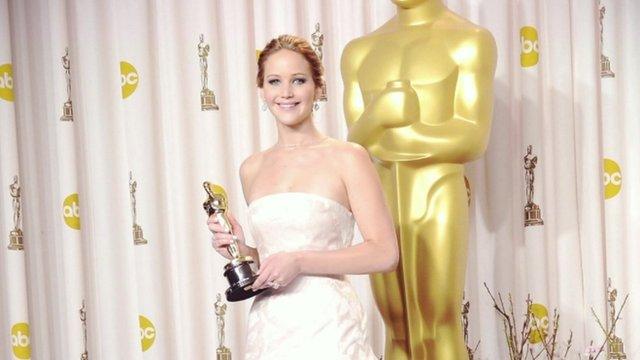Are viewers the 'abusers' in celeb photo leak?
- Published
- comments

As word spread on Sunday evening that hundreds of candid nude photographs of celebrities like Kate Upton and Jennifer Lawrence were being posted to internet forums, discussion quickly turned to who was responsible.
The hackers, clearly, had committed illegal acts. But was Apple's iCloud service, possibly used to surreptitiously access personal data, also to blame? What about the "foolish" women (and men) who took the photos in the first place?
Some have suggested that there are other perpetrators in this case, however - hundreds of thousands of them. They're the viewers who have flocked to message boards like Reddit and 4chan to catch a glimpse of the intimate images.
"This is about women being shamed, and objectified, and treated like property," writes, external Vox's Kelsey McKinney.
As Actress Patricia Arquette bluntly put it, external in a Twitter post on Monday:
"Every time someone opens a stolen intimate nude photo of anyone they are becoming a sexual molester. Participating in a group molestation."
Mary E Winstead, one of the actresses whose photos were stolen, also had a message, external for those who viewed them:
"To those of you looking at photos I took with my husband years ago in the privacy of our home, hope you feel great about yourselves."
She would later post that she is "going on an internet break", in part because of the vitriolic reaction her comments provoked. Her feed, she wrote, external, offers people "a glimpse of what it's like to be a woman who speaks up about anything on Twitter".
People who view and download photos on the internet are accomplices in an assault, agrees, external Australian blogger Clementine Ford for Daily Life.
"If you deliberately seek out any of these images, you are directly participating in the violation not just of numerous women's privacy but also of their bodies," she writes. "These images - which I have not seen and which I will not look for - are intimate, private moments belonging only to the people who appear in them and who they have invited to see them."
The Atlantic's Jessica Valenti says this episode reveals a truth about modern society and our celebrity culture that goes beyond the desire to see famous people in revealing moments.
People are drawn to these illicitly obtained photographs, she contends, because they like to "revel in the humiliation" of the victims.
"There is an obsessive tendency in American culture with elevating women - young, beautiful women, especially - to celebrity status just to bask in their eventual fall," she writes.
She concludes:
"Even if we're not the people who stole the pictures, and even if we're not publishing them on blogs or tweeting them out, looking at naked photos of someone who doesn't want us to goes beyond voyeurism; it's abuse."
The Sydney Morning Herald's Sam de Brito disagrees, external:

Swimsuit model Kate Upton is one of dozens of celebrities who have had candid photographs distributed on the internet this week
"The idea that people who search for pictures of Lawrence are participating in the violation of her body and 'enjoying an ongoing assault' reeks of the kind of spooky nonsensical logic that insists you steal a person's soul if you photograph them."
He says it's similar to saying that people who watched the recorded beheading of journalist James Foley by IS were dishonouring his memory.
"People who go searching for these sorts of images are guilty of curiosity, morbid fascination and, in the case of the JLaw photo hack, poor impulse control," he writes.
He continues:
"Yes, it'd be nice to think people acted with decorum when alone with a laptop in their home, but the seething, Commandment-shattering cesspool that is the internet suggests many do not."
More than abusers or accomplices, writes Gizmodo's Luke Hopewell, the people seeking out these photos are guilty of a double-standard.
In a post, external announcing that his website will not link to any forums containing the leaked photographs, Hopewell writes:
"If you've ever objected to your privacy being violated by tough policies like metadata collection or mass surveillance or Facebook toying with user emotions in news feeds or whatever, you probably shouldn't look at these photos for risk of being a massive hypocrite."
The threat posed by Big Brother and intrusive corporations can be trumped, it seems, by the unquenchable desire for celebrity skin.
- Published2 September 2014

- Published2 September 2014